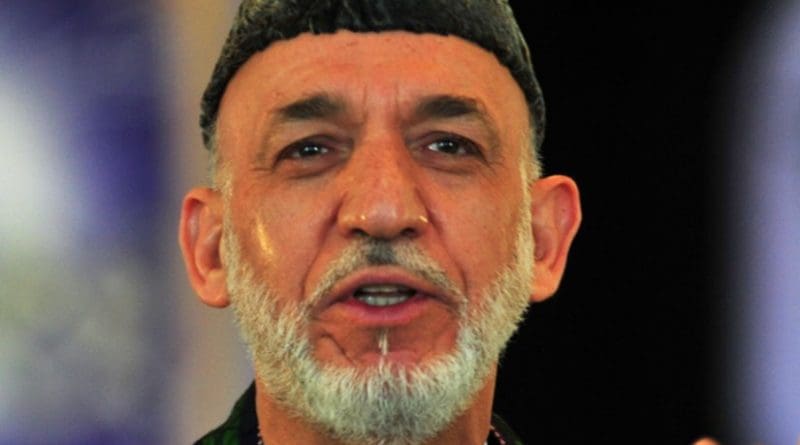Afghan President Karzai Wants Tighter Ties With Neighboring Iran: How Tight And Why? – Analysis
By Dr. Shanthie Mariet D Souza
The ongoing discussions since June this year about a long-term security agreement between the United States and Afghanistan, termed as the “US-Afghan Strategic partnership,” outlines the prospect of the American troops prolonging their stay in Afghanistan beyond 2014.
These secret negotiations come amid a scramble among regional powers to be positioned for what senior US officers are now describing as the “out years” is seen in the region as leading to the beginning of another “Great Game.” Some even call it Great Game 3.
As per the details of the yet-to-be-formalized US-Afghan strategic partnership, limited US troop presence carrying out specialized counter terrorism operations and providing secondary support, mentoring and air power back up to the Afghan forces would be based in at least five bases for the next two or three decades.
Neighboring countries like Iran are vociferous in stating opposition to any such arrangement that will allow the US to position itself firmly in a country, which shares a 936-kilometer-long border with the Islamic Republic.
Iran’s fears of long term (indefinite) US troop presence has heightened with the 300-hectare airbase being built by the US in the desert area of Holang in Ghorian district of Herat province, just 45 kilometers from the Iranian frontier. The US military and the Afghan government say that base is being built for the Afghan National Army. Some experts, however, opine that this base can bring Iran’s entire air space under American domination.
The difficult US-Iran relationship has contributed to the instability in Afghanistan in the last decade. The US officials have long maintained that Iran has been a source of destabilization in Afghanistan and Iraq. They have accused Tehran of extending its anti-US position to aid the insurgency, although Tehran refutes such charges.
At one level, Iran would not like to prevent the return of the Taliban. Its concerns about the war in Afghanistan, which sends scores of refugees and drugs into its territory, are genuine.
Iran has thus extended some assistance to the Afghan government to enforce a stronger border control mechanism. It has built and handed over outposts to the Afghan border guards.
Of late, Iran has also drawn out a plan to legalize the presence of Afghan refugees in Iran. According to the plan, the Iranian Foreign Ministry will take 300 Iranian Rial from each Afghan national who plans to enter the country and will give the money back to them whenever they decide to leave Iran.
In addition, Tehran has supported the present Afghan government through various means. Iran is one of the most important donors to Afghanistan. It has built several roads, power transmission lines, and border stations, among other infrastructural projects in the country.
However, the Iranians feel that the US troop presence in Afghanistan has deprived Tehran to play a larger role in a country with which shares deep historical, cultural, civilizational and economic ties. Tehran further fears that the prolonged US stay in Afghanistan will negate the possibility of enhancing its influence permanently.
To counter this, Tehran has attempted to entrench itself deep inside the Afghan body politic. In October 2010, Hamid Karzai’s office admitted to having received cash payments amounting to thousands of euros from Iran, year after year.
Close associates of President Karzai say that his inner circle is pushing him to move toward Iran as the US forces recede. These advisors belong to Hizb-e-Islami, a group led by Gulbuddin Hekmatyar, who has long served as a proxy for Iran. In a statement the Hizb-e-Islami described establishment of permanent US military bases in Afghanistan as an “eternal occupation” of the country.
In the parliamentary elections last year, allegations were rife of Iran’s monetary support to the Hazaras who are gaining prominence in the Afghan political scene. Iran’s increasing influence on the Afghan political scene, thus cannot be discounted, particularly at a time when the attempts of reconciliation/negotiation towards the Taliban are gaining momentum.
In recent years, visits between the two countries have increased and politicians of both countries have participated in jointly organized forums. Iranian Interior Minister Mostafa Mohammad-Najjar has said at the meeting of the committee chairmen of the Iranian and Afghan parliaments on July 23 in Tehran that such a strategic treaty will pose a threat to the interests of Iran and other regional countries. Iran has maintained that outsiders are not capable of establishing security in Afghanistan.
At the other level, Iran has making common cause with Pakistan as well. Both countries suggest the regional powers need to have a stake in the solution to Afghan problem and a solution imposed by either by the international military efforts or negotiations with the Taliban would not produce enduring results. Iran-Pakistan alliance has caused deep consternation in Saudi Arabia.
The Afghan President is playing a delicate balancing game. In rejecting the first draft of the partnership agreement in its entirety, President Karzai is addressing domestic opposition as well as regional concerns. At the same time, the Afghan officials see an enduring American presence and broader strategic relationship as essential, in part to protect Afghanistan from the onslaughts of the insurgency as well as meddlesome neighbors.
Iran has made its intentions clear of not allowing the US to have a free run in Afghanistan. Would other regional countries join the chorus?
Stability in Afghanistan would remain elusive in absence of an inclusive, representative and transparent regional dialogue.
This article appeared in Al Arabiya and is reprinted with permission

